#Edited the last panel to take out the speech bubble cause it looked like I was implying it was weird to eat bone marrow
Explore tagged Tumblr posts
Text
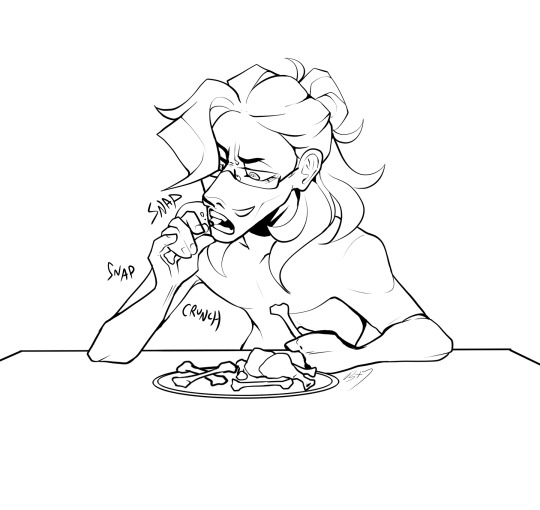

#Saw a man bite straight through a chicken bone on YouTube.#I was gripped. In awe.#A jaw strength rivaled only by - I thought to myself - Present Mic#can't even remember how I got onto the video but it's stuck with me ever since#he had a captivating positive vibe. I would enjoy a meal with him. The chicken looked a little underdone though#bnha#mha#shouta aizawa#hizashi yamada#present mic#bnha comic#not even technically a comic this bad boy is two slides#always thinking about the rooftop gang naming Sushi like 'whats everyones favourite food?'#and Yamada says 'fried chicken' like that would be the best name for a cat- actually. you know what. that is a pretty good name for a cat#Might call my next tarantula Fried Chicken. Who knows?#Edited the last panel to take out the speech bubble cause it looked like I was implying it was weird to eat bone marrow#But I meant the entire bone itself like the crunchy bit#But apparently they do that in some places so I thought that it might come across as a bit insensitive and I didnt wanna get cancelled.#eat bones if you want I would love to eat bones but I'm a coward#It's not really a thing in the UK I don't think. I've never seen anyone do it. I guess we just produce a lot of food waste.#so nobody was going to tell me you could eat bones? I just had to find out myself on Youtube?
594 notes
·
View notes
Text
Shigaraki • Development
Backstory
(Note: Tenko was Shigaraki’s childhood name.)

First things first: Shigaraki’s backstory is probably meant as an allegory. The house his father built is a microcosm of society, his father Kotaro represents people with power, Tenko represents people without it, and the other family members are bystanders. The power imbalance and communal emphasis on harmony enables Kotaro to take out his baggage on Tenko while Tenko is required to repress his. Resistance, even if it’s minor, causes Tenko to be shunned and beggared, as Kotaro locks Tenko out of the house in the backyard, in the dark, unfed, without even a roof over his head.
Edit: @codenamesazanka has an excellent reading of this allegory!
Theirs is a household that prioritizes unity and a façade of happy domesticity over Tenko’s wellbeing. His mom and grandparents treat him gently, reject him kindly, and refuse to admit to him just how terribly Kotaro treats him. Though the three adults understand that Kotaro is the problem (they criticize him in private or cry out futile protests during an incident), they are unwilling to disrespect Kotaro to Tenko’s face. Doing so would mean facing their victim and owning up to their own culpability, too.
So, throughout Shigaraki’s backstory, Horikoshi intersperses black panels with increasing grains of white. This references Shigaraki’s “wound in his heart.”
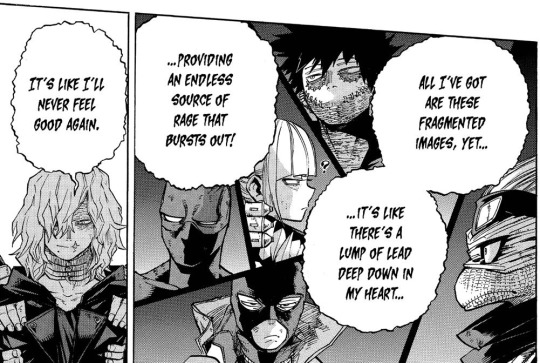
The first black panel appears when Tenko is crying to his mom, Nao, about his dad; the second appears when he is similarly comforted by his grandparents.
After an episode with Kotaro, Nao hesitantly asks Tenko if he still wants to be a hero.
Nao: “Tenko…do you…still want to be a hero?” Tenko: “Yup. Because like, nobody wanted to play with Mikkun and Tomo. So I said, ‘Let’s play together!’ And we played heroes, and it was super fun. And then Mikkun said, ‘You should be All Might, Ten.’ And I was nice and played with them even though they don’t have any friends.”
It’s hard to follow Tenko’s five-year-old’s logic here, but the gist seems like Tenko wants to be a good person who makes people less lonely, and he thinks heroes do that. The implication, then, could be that Tenko is lonely, and his admiration for heroes compensates for what’s missing in his family (a hero).
What’s also significant is that Tenko noticed Mikkun and Tomo were suffering, and instead of ignoring it or playing along like everyone else, he did something about it. What he emphasizes isn’t, “we played heroes and fought bad guys, it was really cool”; he emphasizes that he was kind, that he helped kids who were lonely. This isn’t a kid who wants to be a hero because heroes are strong.
Also worth noting that in bnha, p much every kid wants to be a hero. By forbidding Tenko from even playing, Kotaro draws a line between Tenko and his classmates: Tenko is not one of them. He’s not allowed to dream he’ll be a hero like everyone else. In a society overflowing with heroes (and with adulation of heroes), Tenko can’t be one of them nor admire them.

^^ the first “wound” panel is the black middle one
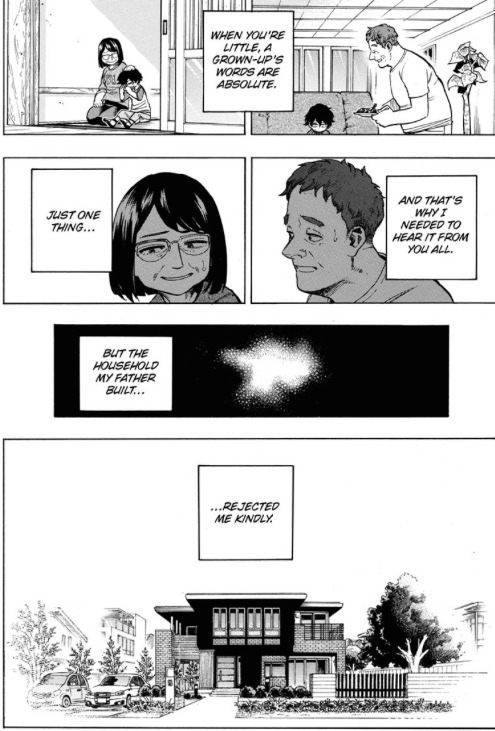
When Nao tells Tenko that “it’s hard to be a hero,” especially right after hesitantly asking him if he still wanted to be one, Tenko understands that she’s discouraging him—similar to how Inko apologized to little Deku when he asked her if he could become a hero without a quirk.
When Nao tells Tenko it’s difficult, she’s essentially repeating what Kotaro says (“being a hero will cause him nothing but trouble”). By siding with Kotaro, she tells Tenko that he can’t become who he wants to be. He must conform to authority and let Kotaro determine his life. What he wants and feels don’t matter. Kotaro is right.
The wound begins to open.
Similarly, his grandparents offer him empty comfort because they, too, believe in presenting a unified front. The kids aren’t allowed to be aware that there’s conflict between the grown-ups: rules are rules, instructions from your seniors are absolute, social harmony (and by extension, social hierarchy) has to be maintained. Tenko himself is the troublesome one—he’s the one who needs to be comforted, who keeps breaking rules, who can’t pretend everything is okay the same way everyone else can.
The wound opens further.
The initial wound and its exacerbation are both brought on by his mom and grandparents, not by Kotaro directly. Why? Because it’s the permissiveness of the adults that socializes Tenko in how to react to Kotaro. Kotaro’s abuse is too much for a five-year-old to process, so he trusts the other grown-ups in his life to understand it and tell him how to feel about it/what to do about it.
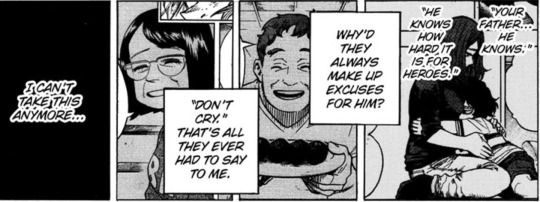
What they tell Tenko, implicitly, is that his pain doesn’t matter enough to do anything about, and it’s his fault it exists. Underneath, he recognizes this and resents them for it. They might not actively participate in Kotaro’s abuse, but they actively support him by trying to wipe away the consequences without any accountability for the problems. They shift blame to other people (Kotaro, Tenko) without owning up to their own role in the proceedings, so that they can pretend life is good and think of themselves as good people who don’t make trouble.
Tenko has a related “wound” associated directly with Kotaro.
((When Kotaro approaches Tenko to begin smacking him…))

The “itch.”
Tenko is five years old, and kids that young aren’t known for their emotional intelligence. This is his little-kid way of trying to describe his negative emotions: agitation, anguish, panic, frustration, aggression, resentment, desperation, (thwarted) hope, and so on.
Tenko scratches himself frantically because he doesn’t know how else to react to the things he’s feeling, and he doesn’t know how else to react because nobody is trying to help him sort through them. He’s only been told to suppress them. Plus, in adulthood, Shigaraki scratches himself when he’s stressed about something, so it makes sense for this ~allergy~ to be the origin.
I dunno why Tenko fixates on his face—his eyes, specifically…maybe out of shame? maybe because his face and eyes are what express his uncomfortable feelings, and/or because his eyes are what he uses to fruitlessly beg for help? or maybe the eyes out of a desire for blindness, to not see what’s in front of him the way everybody else pretends not to see?

(The irony, ofc, is that Kotaro is accusing Tenko of wanting to hurt their family, when in fact Kotaro is the one hurting their family.
Judging by how Nao and her parents approach Kotaro after the fact and tell him that they will leave if he hits the children again, I don’t think it was common for Kotaro to smack Tenko like this.
Also, this is the first time Tenko is shown scratching his neck: when his thoughts are crying out, help me!)
Tenko isn’t begging mercy from Kotaro, which says leagues about their relationship. Instead, he’s begging for interference from the rest of the family, for someone to stand up for him, to challenge the public humiliation Tenko regularly endures as Kotaro’s scapegoat. Nobody does, of course, like always.
It takes a few hours, locked out of the house, for the trauma to set in.

The wound gets worse…but this time it’s different.
For one, it’s accompanied by dialogue, not narration, and “everyone” is centered right in the core of his rage. The second (iffier) difference is that this time the wound and the itch coincide. In the previous situations, he’s either scratching himself or the wound is deepening. This is the first time Horikoshi depicts the two occurring simultaneously, and it’s this moment that his quirk fully awakens.
Tenko kills his dog and begins to have a panic attack. His emotions are choking him; the only way he can ask for help is to reach out to his sister, finally, in the way he didn’t dare to reach out while Kotaro was smacking him.

I’ve seen people suggest his voice fails as a side-effect of his quirk, but I think it’s trauma-related, not physical. For one, he still describes it as an “itch,” and for two, once he processes his trauma and decides that killing his family wasn’t a tragedy, Shigaraki’s characteristic squiggly speech bubbles are replaced by average speech bubbles.

This is consistent, so, his vocal problem was solved emotionally. So maybe his quirk was reacting to his emotions and placing pressure on his vocal chords? But idk, seems to me it was a psychosomatic problem.
Either way, he kills his sister as she runs away, and her scream attracts his mom and grandparents.
Then comes the fourth panel.
(For context, the narration refers to how his negative feelings towards his mom and grandparents accumulated.)
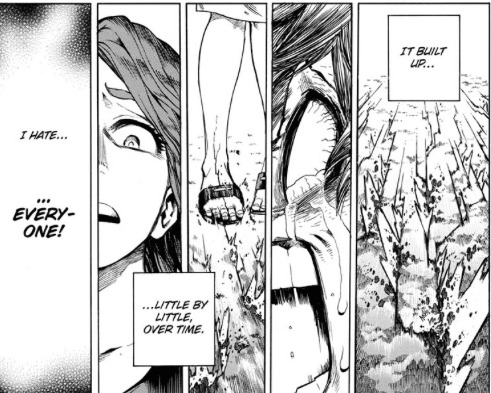
The whiteness is gushing forth, and it surges when Tenko sees his mom staring at him with terror, unable to summon a reassuring smile or any words of comfort for him.
The noises catch Kotaro’s attention. He pokes his head into the hall and walks through the empty house until he spots the open door to the backyard.
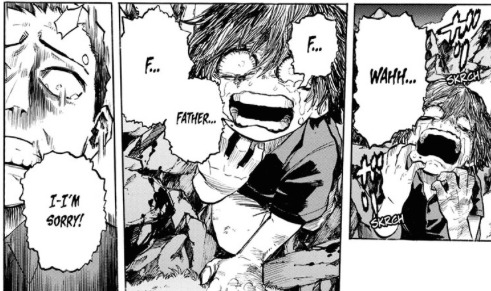
(Tenko has now transitioned to mainly scratching his neck instead of his face.)

Tenko reaches out to someone for the final time, and his (deadly) hand is rejected—smashed away, really.
Kotaro’s life is in danger, he’s shocked by the deaths of his family, he panics, and he reacts cruelly.
The tipping point is what happens afterwards.
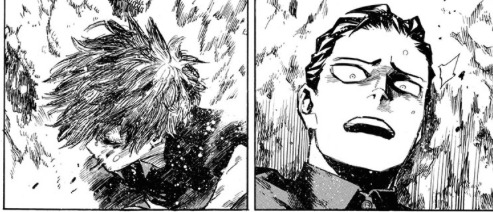
Kotaro is surprised and horrified by what he’s done. But, like always, he stubbornly refuses to acknowledge to Tenko his wrongdoing. Instead, he reacts by doubling down and asserting his authority.

“Mommy, why does Father say no all the time? Does he hate me?!”
I’m not sure quite what Kotaro is doing here. At first I thought he was smacking Tenko, the way he did earlier that day, but that blob in the lower right panel is part of the background, not his hand in motion. So instead, it looks like Kotaro is holding out his hand in a “stop, stand back, stay away from me” gesture, or maybe to literally push Tenko away. (Have to wait on the anime, I guess.)
Regardless, Kotaro tells Tenko “no” for the last time. The immediate blame, the dearth of kindness or sympathy, the reaching out to him—someone’s trying to save him!—only to deny him…it evokes their history. Tenko is already in the midst of a meltdown, and now he snaps.
I hate bringing up real-world examples when thinking about stuff like bnha, so I hope this will be the only time I ever do it, but I’m powerfully reminded of a gun violence incident in Mississippi where a nine-year-old kid and his thirteen-year-old sister got into an argument over a video game controller, and the boy retrieved their parents’ gun from another room and shot her.
It’s ludicrous to think he had any meaningful concept of what he was doing, and, regardless of how Shigaraki interprets his past, the same holds for Tenko. Just because Tenko had a good “reason” to want Kotaro dead doesn’t imply he had a meaningful grasp of what he was doing. He killed Kotaro because he was a kid with access to a deadly weapon, and there’s a reason kids aren’t trusted with those.
But it is meaningful that Shigaraki struggles to make the distinction between aggression and murderous intent. AfO deliberately trains Shigaraki to adopt this warped mindset by telling him that his bad feelings, his “itch,” are equivalent to bloodlust. Realistically, there’re plenty of ways to relieve negative emotion, but Shigaraki has been taught exactly one outlet: destruction. So, he doesn’t realize that his murderousness is a product of nurture, not nature. (Also, lol, “murderousness” is a real word!)
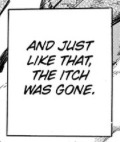
Anyways, for the first time, Tenko experiences catharsis for the negative emotions that have built up his whole life. A fluke of fate enabled him to subvert the established power dynamic, and the destruction of the house encapsulates the collapse of their family’s hierarchy. He still doesn’t understand what he’s done.
By the next morning, it’s begun to sink in. He ran away from the house and then wanders the streets, too consumed by guilt to speak, and he’s ignored by everyone. When someone finally pays attention and seems willing to help him…
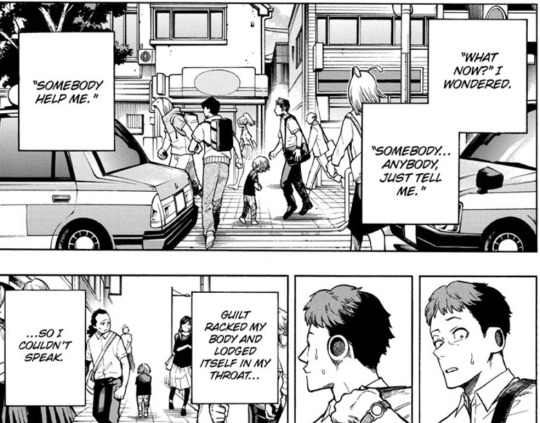

He smiles, happy that someone is finally going to help him. But his dirty, creepy smile scares the old lady off.

(reminds me of his early design.)
To him, it’s like people can see what he’s done, and that’s why nobody will help him or even acknowledge him. Notice the lower left corner: the blackness and white grains, spilling over from his wound.
The itch returns, and the scratching and the wound overlap again. It’s hard to say whether the wound is reacting to the old lady in general, or if it’s tied to the narration line “being punished.”
It occurs when Tenko simultaneously wants to be saved but also thinks he doesn’t deserve it, that everyone can see how bad he is and knows he doesn’t deserve help.
What did Shigaraki learn from this?
Social harmony is forged by repressing conflict, not by resolving it. This happens at his expense, purposefully.
“This is the house my father built.” Creation, construction, building, making walls, making rules, making—these are bad, and they’re performed by the people with authority and power. These things happen for other people, not for his sake.
He’s not important enough to be helped / not worthy of it, and he resents that.
Origin of his self-loathing.
Other notes:
The “itch” is something he can find temporary catharsis for (through violence), and Shigaraki thinks the itch might have gone away if someone had just helped him. The “wound” is not something that ever alleviates or that he suggests could have gone away.
The wound’s origin is from the complicity of his family to Kotaro, not from Kotaro himself.
It’s interesting that his dream to destroy society is a reenactment of his destruction of his family/house, even though killing “everyone” the first time devastated him.
He switched from mostly scratching his face to mostly scratching his throat.
Both these are sites where emotion is expressed.
Hands are another site of expression, and he later develops his fascination with his family’s hands and uses his own hands for destruction.
Activating decay seems to have hugely worsened the scarring around his eyes. He says that he thought the “itch” had gone away, so it’s unlikely he was scratching himself overnight…so I think his quirk had the side-effect of exacerbating his scars? If decay made the skin around his eyes hurt, that could relate to why he switched to mostly scratching his throat.
Even as a kid, Tenko had a certain amount of pride/dignity, enough to blame others for mistreating him instead of blaming purely himself.
Tenko admired heroes partly because his family lacked one, but when he discovers Nana…? Now someone inside the family (inside the house) was a hero, so the rules were different than what he thought?
Upbringing by AfO

When Tenko killed “everyone,” that included himself. All that’s left of him afterwards is an empty shell. He doesn’t even seem to remember what he’s done.
But AfO is willing to extend a hand and touch Tenko.
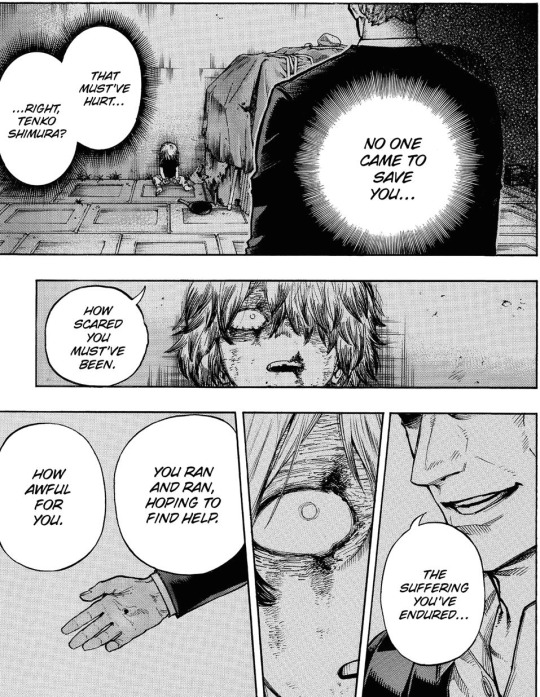
He’s willing to acknowledge Tenko’s pain, something nobody else was or is, at the moment in his life when Tenko feels he least deserves sympathy.
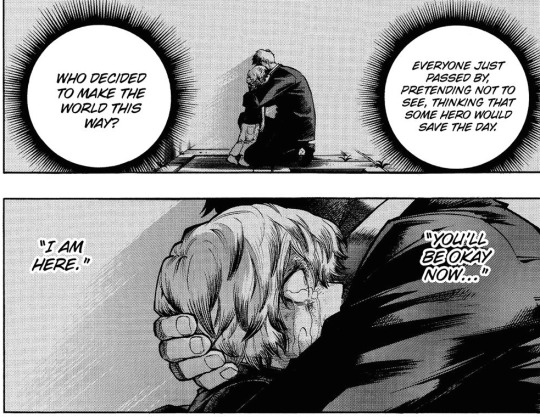
Now, obviously it’s hella suspicious that AfO already knows Tenko’s name, knows what he’s done, and procures his family’s hands, but Shigaraki doesn’t seem to question it. Tenko’s arms dangle there, limp, as AfO embraces him and tears stream down his face. And, ofc, AfO echoes All Might’s motto.
AfO takes Tenko in and tells him he’ll be his master from now on. Then…
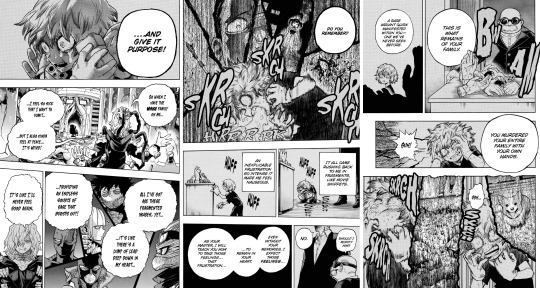
Tenko viscerally remembers what he’s done, and his immediate reaction is to scratch himself, puke, and then seize the severed hands, gathering them up and cradling them close to him. It’s probably then that Tenko discovers the feeling that Shigaraki describes—of feeling violently ill but somehow at peace, too. (“When a person’s life starts spiraling, what’s the one thing they want? Comfort.”) There’s way too much to unpack here, so, moving on.
The “purpose” that AfO alludes to is the destruction of society/the status quo.
While Tenko is huddled on the ground, cradling the hands, AfO continues.

AfO’s the first person willing to talk to him about his itch as emotional instead of as an allergy. He tells Tenko point-blank that he cannot control his impulses and that his release must take the form of destruction.
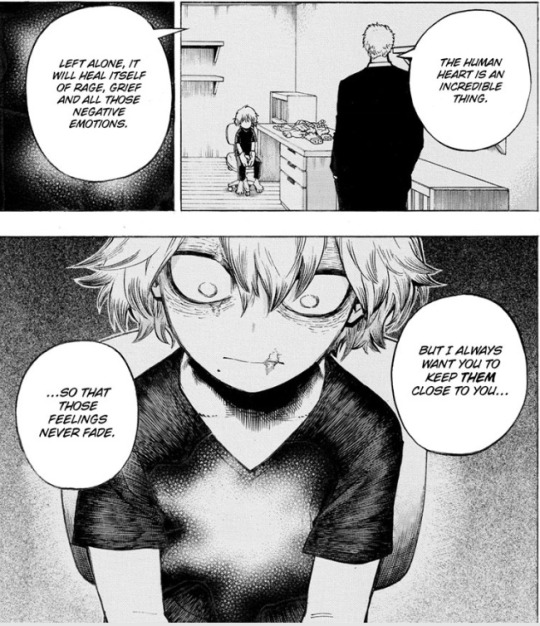
This moment baffles me. AfO openly admits that Tenko’s feelings will fade…if left be. As far as we see, he doesn’t explain to Tenko why it’s important that those feelings never fade, why emptying himself of his pain is a bad thing. But even after being told time would heal him, Tenko keeps the hands close to him—and I don’t think he was just doing what AfO wanted.
This panel is also interesting because it definitely makes it look like Tenko’s wound is glowing, like it’s a light in the dark. Also, AfO’s dialogue nearly obscures the early panel of the wound…hm.
Regardless, AfO implies that those feelings are the most important thing Tenko has, and he should keep them close. It’s not specified if AfO told him to wear his family.
Later, Tenko’s wandering on the streets (his hands aren’t with him) when he encounters a duo of thugs, who beat and mock him. At first, Tenko lurches to fight back, but…

I think these are more “wound” panels: the blackness with white grains. He backs down, even though his rage doesn’t dissipate.
When he returns home, AfO encourages him to embrace his feelings instead of holding them back. Tenko literally writhes on the floor from the force of his “itch,” going all out as he wallows in his overwhelming feelings.
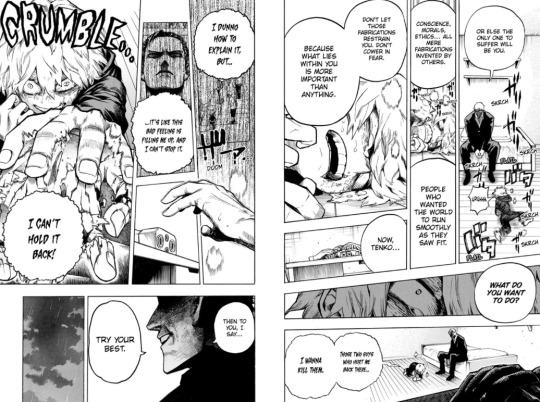
AfO tells Tenko that ethics were invented in order to suppress people and that Tenko’s emotions are more important than anything else. Tenko responds by reiterating what AfO told him: he wants to destroy those thugs, and he can’t control this urge to destroy. He goes as far as to disintegrate one of Kotaro’s hands, even though not too long ago he clung onto it.
But, later, he wears his family’s hands for the first time.
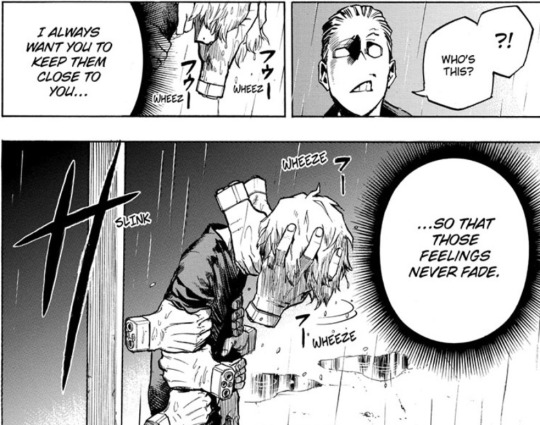
Wearing them clearly affects Tenko adversely—he’s struggling to breathe properly, and he’s entirely slumped over. But these hands, and these feelings, are the only things he has left, the only things he knows, and he won’t leave them behind.
He encounters the same duo of thugs and kills them.

His wound again. Formless, but with a sense of shifting and movement. Undiminished, even if the itch is alleviated. Or, maybe this panel is supposed to indicate a deterioration, like the wound gets even worse after the murders?
Observing the event, Ujiko remarks that he’d thought Tenko had lost his memories. I think he’s commenting on how Tenko is wearing the hands despite not remembering who they’re from?
AfO comments…

Tenko restrains quirk subconsciously, limiting its disintegration to just what he’s directly touching, which makes it seem like he’s afraid of his quirk and feels guilt/self-loathing for it. He’s aware that his quirk is connected to the things he feels, maybe even blames his quirk in some way for making him feel this way.


It’s ironic that Tenko feels free while he’s being throttled and restrained by the hands of his relatives.
lol AfO gives away the game a bit, here. He tells Tenko to do whatever he wants and not hold back, and then praises Tenko for “holding back” his tears. He just wants Tenko to have no way to vent his feelings except violence. Also, the fact that Tenko is “holding back” his quirk…hmm.
Again, too much here to unpack rn, so, moving on.
AfO gives Tenko the hands of the thugs he killed, plus one hand of unknown origin to replace the hand of Kotaro’s that Tenko destroyed. Shigaraki describes the gift as soothing to his battered body, and he felt reborn. AfO gives him the name Shigaraki Tomura ad implicitly positions himself as Shigaraki’s dad by telling Shigaraki that “Shigaraki” is his surname.
What did Shigaraki learn from this?
Morals are illusionary, merely a tool used to suppress people without power in order to make things easier for people who do have power.
His “itch” means bloodlust, and he can’t control it.
He should just do what he wants (except crying, apparently), or else he’ll just suffer indefinitely.
Rejection of a society he had no hand in making and no place to belong in.
Other notes:
Even without remembering his aggression towards Kotaro, it’s Kotaro’s hand he shows the biggest fixation on.
Shigaraki has three “ailments”: the itch (the agitation he feels from bad things), the wound (the “rage” and “frustration” he feels from bystander apathy), and the nausea he feels when he wears the hands (self-loathing?).
Or maybe the nausea is part of the wound?
More on the wound?
I wonder when Horikoshi decided on how to visualize Shigaraki’s pain, and if he uses it as a pattern in bnha.
I’ve noticed a few panels that remind me of Shigaraki’s wound, especially that amorphous panel after he kills those thugs, but it’s hard to tell if the backgrounds are just atmospheric or if there is actually an attempt to connect these moments thematically.
Here are a few that I noticed.
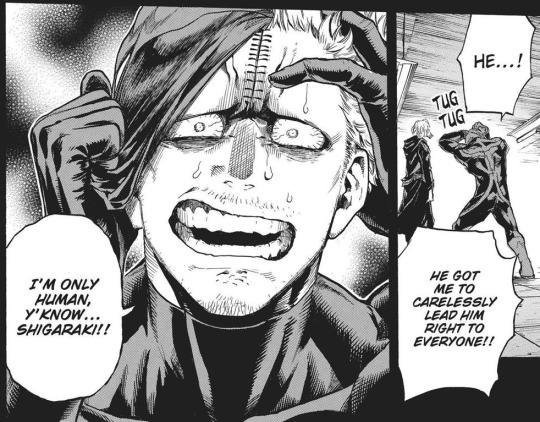
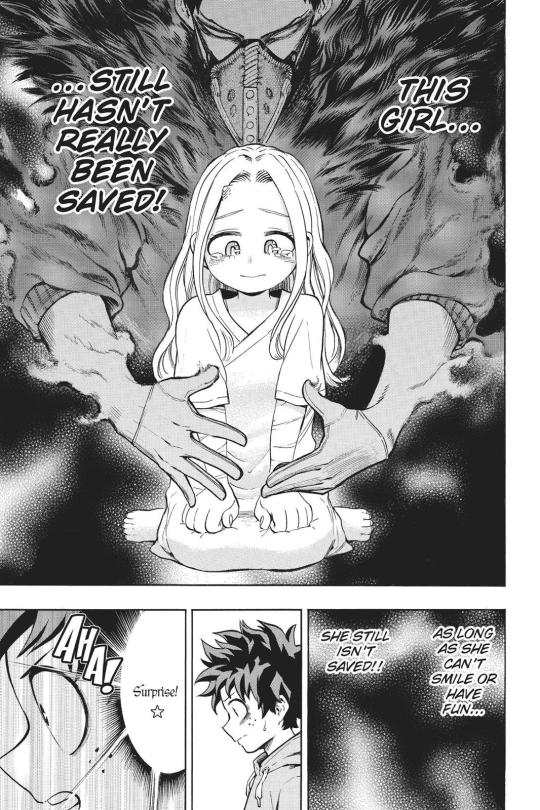

I’m going to keep an eye out ¯\_(ツ)_/¯
Edit: here’s another one. This is the most definite example so far: it occurs in ch250, post-Shigaraki’s flashbacks, and the distinct circle doesn’t produce an atmosphere the way the previous ^^ panels do.
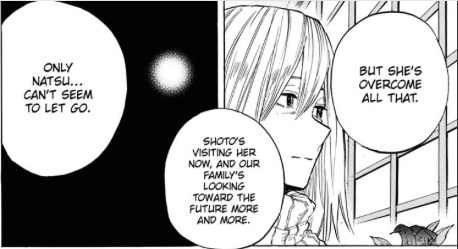
^^ it’s worth mentioning that this appears during Fuyumi’s narration, detailing how Natsuo is the only one in the family who can’t move forward, ie, he’s experiencing social pressure to conform and validate Endeavor similar to how Tenko felt pressure to conform to Kotaro’s authority.
And then this next one, I’m pretty unsure about, but I’ll include it in case:
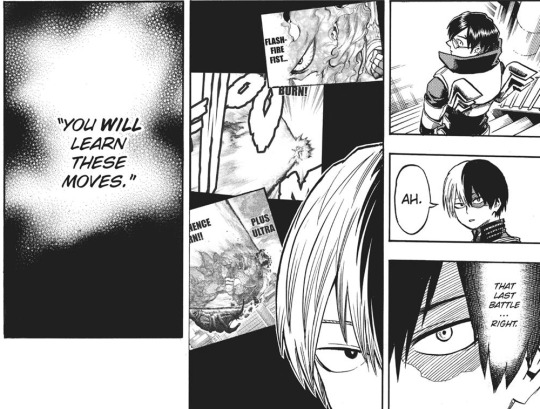
#bnha#bnha meta#shigaraki tomura#shigaraki development#this is mostly me like…summarizing what happened with a bit of active analysis#sorry that the tone is so weird#I wrote this as ref material for myself bc I was sick of jumping between chapters trying to put things in chronological order#and I needed to organize my thoughts on stuff#though I got tired by the end#maybe I'll update it when I feel re-inspired#but anyways here it is if anybody else wants it#bnha manga spoilers#mla arc#no.13
252 notes
·
View notes
Text
Boku No Hero Academia Chapter 267 SPOILERS
(Horikoshi I SWEAR TO GOD)
.
.
.
.
.
.
.
.
.
.
.
.
.
.
.
.
.
.
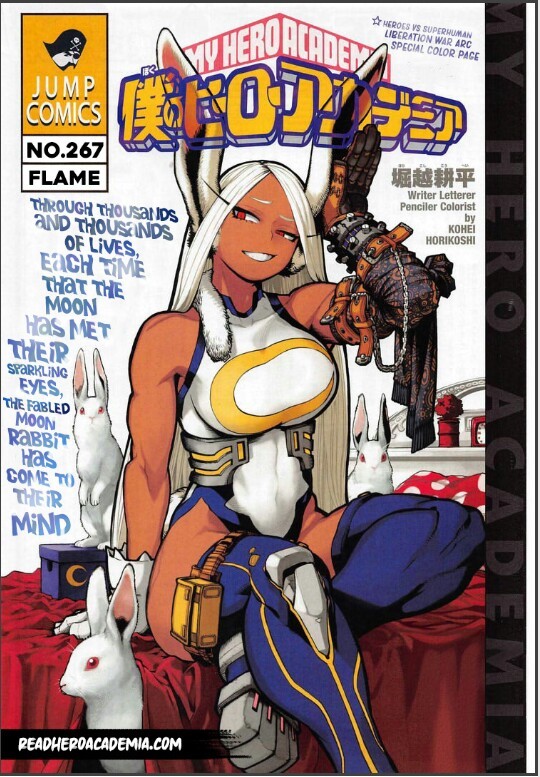
Bow before your Queen, peasants. Ignoring her badass looking arm for a sec, is that right leg a prosthetic? It isn't drawn the same as the left one. It looks more robotic too. Horikoshi would be the type of guy to have her loose her leg too, huh?
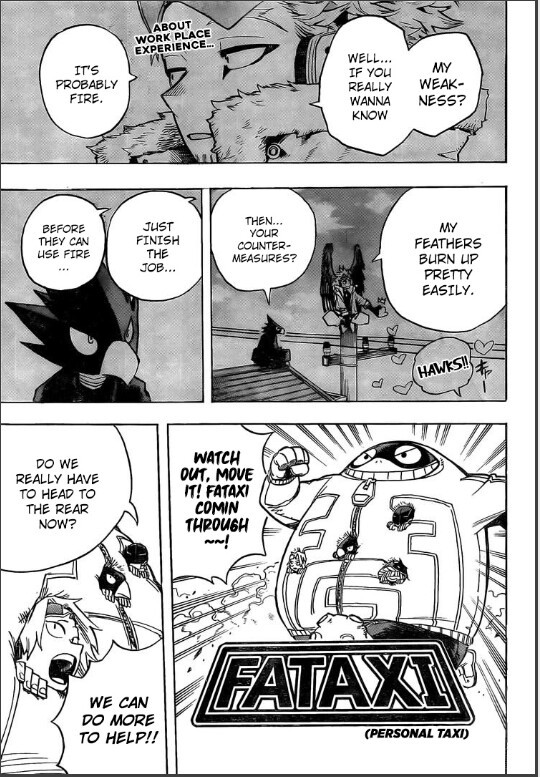
Why is Tokoyami remembering this now of all times? Is this another death flag for Hawks? After what happened last chapter most definitely yes.
Fataxi lol. He's embraced his true calling. And he's got all the kids now! Now that Mudman and Chargebolt had a taste of blood they want more. I'm glad the kids are heading back to the rear tho.
Fat explains to the kids what Midnight said to them before the raid started, that they only needed the kids for a little bit and then it's off to the rear with them, and they meant that shit. Now it's the adults turn to wreak havoc on the villains and as Fat says this we can see Dabi's fire exploding out of the top floor of the mansion. This catches Tokoyami's attention and he looks back just in time to see not really see him but the line of fire that follows him as he flies at moc 2 around the mansion Hawks fly out and away from it. Tokoyami better not do what I think he's gonna do.

In case you were, for whatever reason, in denial about Twice dying.
Holy shit Hawks' wings are practically non existent at this point. Like, all that's left is the outline of their bones and that's it. He looks terrible and is still very much on fire. Dabi's fire is getting hotter. Is that because he's pissed?
Dabi congratulates Hawks on his heroic deed of committing a murder and stomp down on Hawks so he won't go anywhere not like he can, he got no wings.
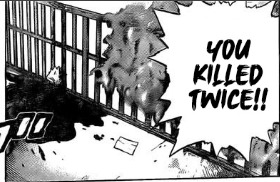
There he is! I was starting to get worried since Horikoshi hasn't shown us anything gory for a while.
Anyway. Dabi's got this unhinged looking grin on his face and Hawks is like "Yo what the fuck? I just killed your friend and you don't look to broken up about it." Dabi responds by saying his tear ducts are burnt so he's physically incapable of crying and that Twice was the key to achieving what he wanted so of course he's sad, heartbroken even. What a great friend you had Twice.
Hawks says he researched everyone in the league and the only people who came up empty was one crusty boi and one burnt boi.
We get a flashback from Hawks to when the commission first brought him in and they tell him he's part of a special program to make super powerful heroes and that training is gonna be incredibly difficult. They ask if he can handle it and Hawks says yeah not like he has much choice.

OH MY GOD HE WANTED TO SHINE LIKE ENDEAVOUR CAUSE HE SAVED HIM. Ya did a little more than beat up bad guys but that's not what we're talking about here. Is it finally gonna happen? Are we FINALLY gonna have a Dabi reveal???
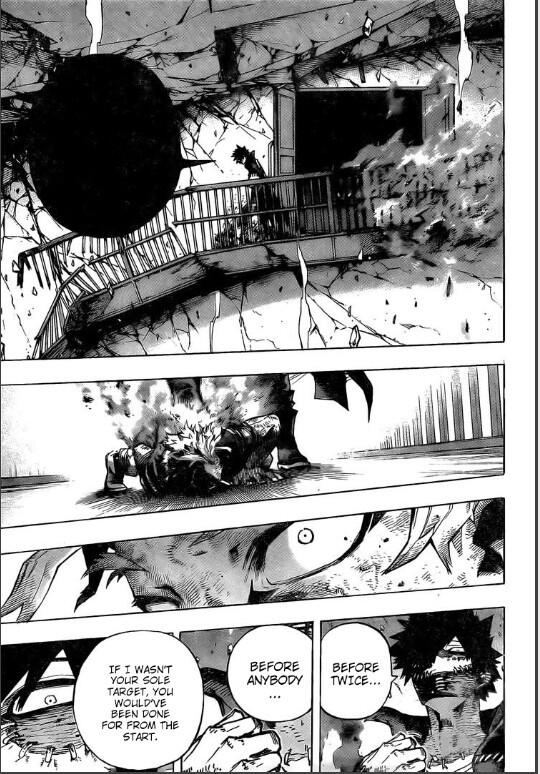
HORIKOSHI YOU BITCH! I fucking knew he was gonna pull some shit like this! God fucking damnit! You know, I'm more upset with myself for hoping. Shit. If that speech bubble isn't blacked out in the viz translations I'll be very happy.
Judging by Hawks' reaction the Dabi's true identity is super shocking. HMMMMM I WONDER WHO IT COULD BE TO HAVE GARNERED SUCH A REACTION FROM OUR RESIDENT BURNT CHICKEN HMMMMM.
I don't really understand what Dabi is saying here. I think it might be how it's worded.
Dabi goes on to say Hawks shouldn't have focused on the league, that one man's philosophy can change the world and that he is the "ultimate manifestation of Stain's will".
Dabi says goodbye to Hawks and that doesn't give a shit about Hawks' life and death and we see the start of his fire on Hawks' face only to immediately cut to Giganto. He's staring at the radio in his hands, probably waiting on Shigaraki to wake the fuck up and give him something to do. I swear if Hawks ends up dying too I-
We cut again back to Jakku where Her royal Highness, Queen of ignoring personal health and the long term effects it has on your body, Miruko who is not having a fun time with the Noumu.
The Noumu are adapting to her moves and, as a result, are causing them to be ineffective. Despite this, Miruko said fuck it and is now charging towards where Ujiko and Shiggy are.
The Noumu are not pleased with this latest development and the one with the weird spine hat thing attacks her, successfully injuring one of her ears and grazing her side. Another Noumu manages to rip off a fist full of her hair too. Horikoshi is entering dangerous waters now.
Miruko is thinking "If I'm dying today I'm taking Shigaraki and the doctor with me" while bleeding like she has an unlimited amount of it in her body. I would very much like it if Miruko didn't die too. We can't have two potential character deaths in one chapter. I refuse it.
Miruko is in the room with Ujiko and Shigaraki and it looks like she might actually win.
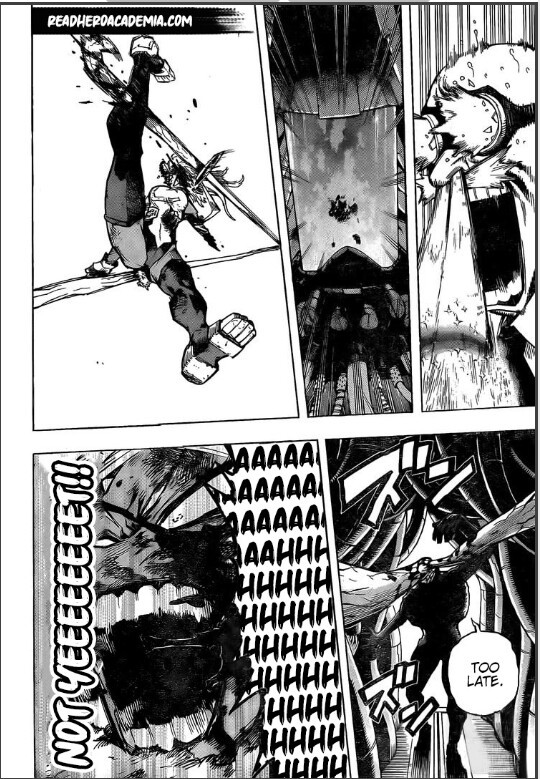
NOPE NEVER MIND! Horikoshi's just killing off everyone this arc, huh? No one is safe from him.
At least the Noumu went for the legs this time (;_;).
OMG Ujiko's face is, once again, hilarious. He completely shattered his goggles with his tears.

(Edit: just realised that you can see Enji's flames behind the Noumu)
Back to the mansion. You alright there Dabi? Was the idea of killing Hawks to much for you?

OH SHIT! TSUKUYOMI TO THE RESCUE!
Oh shit. WHAT THE FUCK IS HE DOING HERE FATGUM YOU HAD ONE JOB. How did that conversation go? "Fat Gum Hawks is in danger and as his protege I must fulfil my shonan manga destiny and save him" "Aight fam just don't die, yeah? Aizawa would kill me" ?????? How could you let this happen. Dark Shadow is weak to light and what does fire make a lot of? OH YEAH LIGHT! Dabi's gonna roast him alive without a second thought. Or crush his spirit with the news of what Hawks did. Shit.

AND HERE COMES MOTHERFUCKING ENDEAVOUR. TOOK YOU LONG ENOUGH. FUCK. I feel like breaking that glass tank is the last thing she should do but go off girl.
This chapter was emotionally exhausting. Like shit Horikoshi give me a break. I knew he was gonna pull some bullshit cop out with the Dabi reveal. I'm gonna do some investigating with that panel just in case Hori tries to hide something. This man really is like a succubus. Or I guess he would be an incubus.
I think Shiggy is gonna wake up because Miruko broke the tank. Giganto is gonna start throwing punches. TOKOYAMI BETTER HAS STAY ALIVE. And yeah. That's it.
Until next time.
#boku no hero academia#boku no hero academia spoilers#bnha#bnha spoilers#bnha manga#bnha manga spoilers#bnha chapter 267#bnha chapter 267 spoilers#i made a quesadilla this morning and im proud of myself
108 notes
·
View notes
Photo

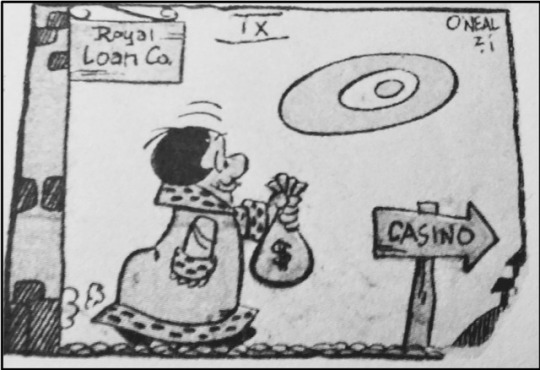
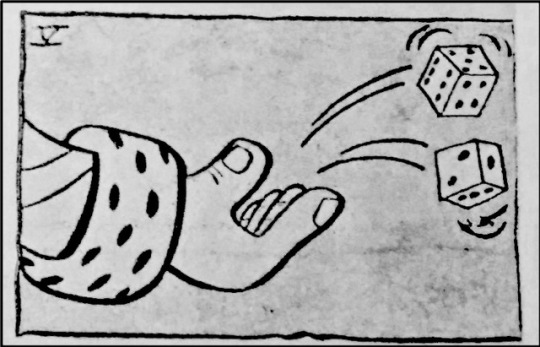
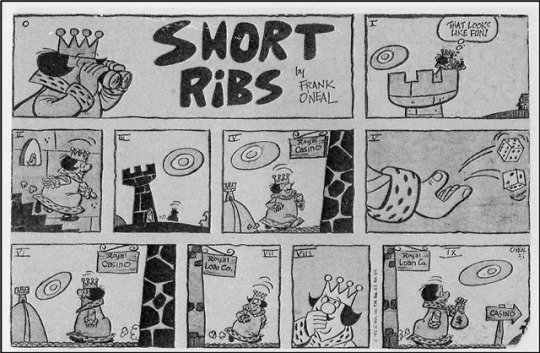
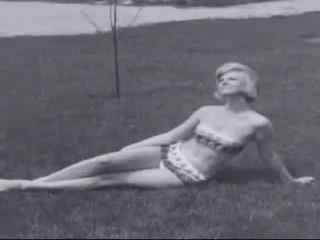
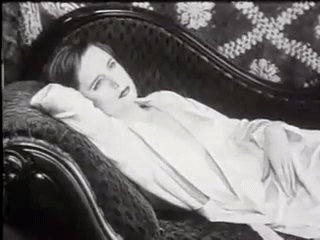
Visual Storytelling in Animation
The second half of our lecture with Lysney primarily covered the varying aspects of visual storytelling, in particularly relevant if I choose the visual analysis question. This weeks lecture covers the impact of using visual language a primary tool to explore story and discourse. With both live action and animation being visual mediums, a good rule of thumb in cinema is to try and present information visually first, introducing dialogue, sound and speech as secondary elements to enhance the audience's experience throughout the narrative.
When we think of narrative intrigue, we can reflect on structuralist critic Roland Barthes, who, through identifying give narrative codes suggested how we used varying elements of the film to build up mystery and suspense. By posing questions which can only be answered through the narrative, leaving the audience to answer the plot themselves, leaves them more gratified to understanding the essential narrative throughout the film.
'I felt that in any country you wouldnt need dialogue to understand the plot. All you needed was a cat and a mouse’ (Joseph Barbera, co-creator of Tom and Jerry)
Casual Connection
The brain's desire to connect random elements helps enable ‘visual storytelling’ within an audience. We can understand that visual storytelling works its best when the images have been juxtaposed in such a way to add in what we’re explicitly not being told. This is one of the most important and prominent techniques in screenwriting analysis’. This technique, ‘Elipsis’ is the single most important skill for screenwriters to master.
Elipsis - The deliberate omission of plot details or events that could be inferred through contextual clues and/or surrounding action. Interfering what happens through the passage of time.
This is evident even in Kirsten Lepore’s ‘Bottle’. Once we established the fact that the two elemental characters are passing a bottle across the sea, we can take out the visual passage and just show the items in the bottle itself. Audiences don't enjoy being patronised, taking away elements of the narrative we don't need to see brings a new pace and sense of development to the narrative. Establishing an incline in the development of the narrative, the audience is no longer dependant on seeing unnecessary shots to understand the exchange of the items via the bottle.
‘Explanation kills drama’ (Yorke, 2013)
Ellipsis’ also work on another of Roland Barthes Cultural Codes, meaning that we as audiences draw from our cultural contexts and our own past experiences to ‘fill in the gaps’ creating satisfactory meanings. When this happens, we the viewer becomes the screenwriter and we merely become the supplier of the stimuli. Cultural ellipsis’ work because of the shared cultural understanding of the audience. Which is why we may not pick up on different cultural ellipsis. This understanding of cultural ellipsis relies on the audiences common or cultural knowledge of the narrative and much like older texts, can be harder to read as we might not understand the cultural cues and clues the author could take granted when presented to a contemporary audience.
The Kuleshov Effect
This concept was further established by Lev Kuleshov, a Russian director who filmed an actor staring into the camera. By compositing a series of secondary videos in reaction to his stare, audiences were stunned by the range of emotions one shot was able to portray. Amazed by his ability to evoke, hunger, grief and desire. The Kuleshov effect established how the assembly of a film can change the moral meaning to create a series of different ideas. Establishing how meaning is achieved through the assembly of shots, whole meanings and theme can be created by the way shots are spliced and showcased together.
In case and point, the same footage of the actor was used for each scenario. Applying the same principles of ellipsis, if things are juxtaposed, audiences will automatically attempt to convey a story between the items themselves.
‘Narrative discourse consists of a connected sequence of narrative statements’ (Chatman, 1980, p.31).
We might think of narrative statements as spoken or written words, but there are other ways of relaying what happens in a scene. And the way in which we interpret a series of narrative statements using visual language along, this is done by reflecting on two styles of narrative statements;
Process Statements - Something is done or happens
Statis Statements - Something ‘simply exists’ or ‘is’
Chatman (1980) describes this deliberate decoding as reading out, rather than simply reading a text, making the point that reading is itself not natural but culturally dependent.
‘Good storytelling never gives you four, it gives you two plus two… Don't give the audience the answer; give the audience the pieces and compel them to conclude the answer.’ (Andrew Stanton: TED, 2012)
Decoding a narrative in pictures, using this process, Chatman discussed that by cultural influence on a very basic level we are able to depict narrative through visual language, processing and conjuring up the bits left out from visual language itself. This is prominent in Frank O’Neals ‘Short Ribs’ in which Chatman is able to explore the narrative in pictures due to the varying array of visual language used both in and outside of each panel.
Frame 0: ‘There is a king’ (stasis statement).
‘The king is excited’ (stasis statement - manifested by the curved lines over the eyes to suggest movement) The king looks through binoculars (process statement)
Frame 1: ‘The king is on the tower…’ (stasis statement). The Cultural Code: our ‘cultural’ knowledge about kings suggests to us that this is the king’s tower.
The king thinks to himself (process statement). We recognise the cartoon convention: the “thought” bubble. We locate the fun: there is a building below and to the right = the fun must be there?
Frame 2: The king runs quickly down the stairs (process statement). We must recognise the cartoon conventions: Both feet off the ground. Clouds of dust behind him and motion lines above his head.
Frame 3: The king runs (process statement). towards the building where the ‘fun’ is happening. No other building is visible = we infer that this is the building that looks like ‘fun’.
Frame 4: The king is eager to have fun (stasis statement) = smile on face.
Natural-language – the ‘legend’ on the sign = the king is about to enter the Royal Casino.
Frame 5: We infer that the king entered the casino between frames. (Cultural code = common knowledge about what might happen in a casino.)
The motion of dice indicated through cartoon convention. Visual synecdoche: only the hand and cuff are shown – but we infer that the king is performing this action. (Synecdoche: the part stands for the whole.)
Frame 6: The king leaves (process statement). slowly (convention: both feet on the ground).
‘The king is dejected’ (stasis statement). (convention: mouth and arms drooping). We infer that the king has lost the money (we can infer a prior event from the ‘stasis statement of an existent’.
Frame 7: Legend in ‘natural language’ to identify the loan company.
The king notices the loan company (convention: the motion of head).
Frame 8: The king has a thought (angle of the head, hand to mouth).
The king looks crafty (convention: angle of eyebrows.)
Frame 9: The king leaves the loan company with a bag of money (symbolic device).
‘His crown is missing (stasis statement). Therefore we infer that the king has pawned it - Cultural code.
The king is on his way back to the casino (process statement) from which we infer he will gamble again.
Having gone over and established all of the suggested topics of research needed for our essay, this concludes our last lecture with Lynsey for this year. What I have to do now is ensure that I recap over all of the resources provided on the VLE, to see what I can use to support and use as a foundation for my 1500 word essay. Ensuring that I cover all the relevant points its important that I begin to break down my research and choose an essay question to respond to in the hopes of using what I’ve learnt to best effect. It's important that I include a range of research not only digital but incorporate both, print and analogue as well to show a range of sources.
To summarise;
I identified how shots are assembled by establishing a cause and effect of emotions to their given audience.
Consider how animation as a medium impacts my chosen animation, is it crucial to the narrative?
Select a final essay question and begin compiling research on my ideas and response to my chosen film.
Complete the first draft of my 1500 word essay for my group tutorial next week.
Sources;
‘Alfred Hitchcock explains about Cutting, Assembly, Montage and Editing.’ Youtube Video https://www.youtube.com/watch?v=kHvcScioNts
‘Kuleshov Effect / Effetto Kuleshov’ Youtube Video https://www.youtube.com/watch?v=_gGl3LJ7vHc
0 notes
Text
Emiya Chii Chapter 4
I’m an unofficial translator for the 衛宮さんちの今日のごはん or Today’s Menu for the Emiya Family.
I translated chapter 4 and that was edited and type set by Miden and QC by Amelia. Type-set version: https://mangadex.org/chapter/142474/1 Here’s was the rough script:
Pg 45
Chapter 4: Spring Vegetables and Bacon Sandwich
Panel 2
Neko: My bad~ Emiyan.
Neko 2: But, you really bailed me out.
Neko 3: Since the last stop is Ryudou Temple.
Panel 3:
Neko 1: Well, isn’t this a bit much for one person? I could probably do it. Buuut~
Neko 2: It’s a lot to carry for one person, right?
Shirou: Can I even say “no?”
Panel ¾ bubble: On his way to his part time job at the Liquor Store—Copenhagen, Shirou was swept up and dragged along for a delivery
pg 46
panel 2-3:
Shirou: Let's see.
Panel 4:
Shirou: He’s still here, huh…
Panel 5:
Neko: hm? Something wrong?
Shirou: No, everything's fine.
Panel 6-7:
Neko: There! Finished! You were a great help! Cause of you, we were able to finish ahead of schedule.
Panel 7:
Shirou: If it's something like this, I'll always lend you a hand.
Pg 47:
Panel 1
Reiken: Oh?
Reiken 2: If it isn’t Neko-San and Shirou-kun.
Shirou: Reikan-san.
Neko: Sup Reikan? We've dropped your sake off over there.
Panel 2:
Reikan: Appreciate it.
Panel 3:
Shirou: Are those from the mountains…?
The wildlife might be more diverse than I thought.
Panel 3-4:
Reikan: Hmmm? Oh, you're talking about these, huh?
The mountain is bountiful. We'll be having things like Vegetable Tempura and Ohitashi style vegetables for a while. After all, this is our Spring Harvest.
panel 5:
Shirou: With this, I should be able prepare something simple like a Sandwich.
Neko: A sandwich, huh?
Panel 6:
Shirou: The vegetables would need to be shocked and then I would grill some thinly cut bacon and an egg. Then I would bind the sandwich together with a grained mustard sauce...
Panel 7:
Neko: ...Emiyan must be hungry, huh? It is around lunch time after all.
Aside: And we just finished with work after all.
Reikan: Ah. Your right. It is about lunch time. *
Panel 8:
Reikan: Shiro-kun, this modest monk also grows interested in this sandwich...but...
Panel 9:
Shirou: Huh? Umm?
Aside: You’re… saying you want me to cook, right?
48
Panel 1
Reikan: While the kitchen is lacking, please feel free to use it!
Neko: Since you have energy to spare~
Shirou's aside: ...were their insinuations.
Panel 2:
Shirou 1: The Ryuudou Temple Kitchen is more complete than I thought it would be.
Shirou 2: It seems like I won't have to go out and buy anything, but the kitchenware isn't uniform. I wonder... is this Caster's doing?
Shirou's imagination of Caster: "Sochirou's food will be handle by me!"
Panel 3:
Shirou: Okay!
Asside: I'll be stepping into your domain for a while*
*Took liberties here. A more literally translation with implication stated is: I will be borrowing your esteemed kitchen for a while. Basically, Shirou breaks out a really formal level of Japanese that is outside his normal parameters of speech.
Panel 4:
Instructions 1:
First create and prepare the Karashi butter by mixing Karashi* and butter in a pan until it becomes paste like.
*Wagarashi is a unique type of spicy, Japanese mustard, but in the American sphere the ingredient is called “Karashi”
Instruction 2 box: To prepare the sauce, we will be using mayonnaise, grained mustard, honey, and crushed pepper. The ingredients will be mixed together to make the sandwich sauce.
Aside near bowls :Margarine is a suitable replacement for butter
Upper right bottle: Mayonnaise
Bottom right bottle: Pepper
Upper left bottle: Honey
Bottom left bottle: Grained Mustard
Panel 5:
Instruction bubble 1:
Boil water with a pinch of salt and then heat the leafy green vegetable in the hot water until its stem becomes firm. This process will take between one to two minutes.
Instruction 2: When the water boils, place the vegetables into a bowl of cold water.
Aside in Instruction 2: Be sure to pour the scum out to remove the bitterness
Panel 6
Instruction: Remove excess water.
Panel 7:
Instruction 1: Season the egg with salt and then scramble.
Aside: If possible, try to avoid breaking the egg into multiple pieces.
pg 49
Panel 1:
Instruction: Using low to medium heat, panfry a few large cuts of bacon in oil until the meat is well done.
Warning: The oil can easily splash out, so be careful
Panel 2:
Instruction 2: After that, remove the excess oil. Something as simple as napkins can act as an absorbent.
Panel 3:
Instruction:
On a slice of loaf bread, spread the Karashi Butter and fill out the sandwich.
1. Spread the Karshi Butter
2. Set the bacon.
In the next step, the vegetables will be added. However, it is not recommended to allow the vegetables to come in direct contact with bread.
3. Used the shocked vegetables to fill the bread slice.
If the harder ingredients are layered this way, the sandwich would be easier to cut in the end.
4. Add the sauce,
5.the scramble eggs,
6. and then the last slice of bread.
Panel 4:
Instruction 1: Immediately after that and before you consider cutting the sandwich, you will want to preserve the bread's moisture by wrapping the sandwich in plastic wrap.
Instruction 2: Using a flat object, flatten the sandwich so that the ingredients will distribute itself evenly. This process should not take too long, but somewhere between five to ten minutes should be good.
Aside: A cutting board would be sufficient for the job.
Panel 5:
Instruction: Then using a kitchen knife, cut the sandwich in your preferred size...
Panel 6
Neko: Something smells incredible~
asside: My bad for not helping you.
Shirou: Ah! Great timing, Neko-san!
Panel 7:
Reikan: Nice!
Neko's aside: heeee~
Neko: It looks delicious, Emiyan~
Pg 50
Panel 2:
Reikan: Issei told me that Shirou is an amazing chief, but wow!
Aside: Speaking of Issei, it's unfortunate that he's absent today.
Aside 2:Today Issei is at school.
Panel 3:
Neko-kun, shall we dig in?
Panel 5:
Kojiro: Well...
Panel 6:
Kojiro: What are you up to,
pg 51
panel 1
Kojiro: Master of Saber?
Panel 2:
Shirou: Hmmm...
Panel 3:
Shirou: Caster isn't here today, huh?
Kojiro: Unfortunately, my masters are currently absent.
Aside: They went over there, perhaps?
Shirou 2: Ha~~so, I was right, huh?
Panel 4:
Kojiro: Is that what you came here to ask?
Shirou: Oh. Not really.
Panel 5:
Shirou: I made sandwiches and wondered if you wanted some.
Panel 7:
Kojiro: Well. Well.
pg 52:
Panel 1:
Kojiro: If you leave it over there, I'll make sure to give it a taste.
Shirou: Okay...
Panel 2:
Shirou: Got it. Then I'll come back for the plate later.
Panel 7: Huh?
Pg 53:
Panel 1:
Kojiro: Hou. This...charlock
Kojiro 2: Isn't too bad.
panel 2:
Neko: Yuuuup. This really is good. What do you think about adding this to our menu?
Aside: Then again, the maker is Emiyan.
Reiken: Didn't think about using the charlock this way...
Aside: I see. I see.
Panel 3:
Shirou: Well, we can later trying adding the charlock to pasta or tempura. Both sound good to me.
Reiken and Neko: Hmmmm
Panel 4-5:
Issei: I'm home, Reikan. Did you hear about the—
Issei 2: Ah. If it isn't Emiya?
Shirou's aside: Issei.
54
Panel 1:
**I've reordered the aside to be a part of the dialogue...It just flowed a bit more naturally to me when I did that.
Reiken: So, Issei's finished with work?
Reiken: Perfect timing. We've been eating the handmade food that you've been raving on about.
Reiken 3: If you don't hurry up, there gonna disappear soon.
** This is a more literal translation of what was said:
Handwritten line: Speaking of rumors....
Reiken: So, you come home, Issei?
Reiken: That's perfect. We're currently eating Emiya's handmade sandwiches.
Reiken: If you don't hurry and eat some, they're going to disappear.
Issei's asside: What did you say!
panel 2:
Issei: Emiya's sandwich.....
Emiya: There's still some left over...
Panel 3:
Issei: Yes. This definitely confirms my belief that Emiya is a master-class chief.
om nom nom
Panel 4:
Shirou: Huh? He's...gone?
Panel 5
Shirou: Hmm?
Pg 55
Left side:
[Ingredients] 4 servings
Sandwich Bread (8~10 slices) : 1 loaf
Charlock : 1 ~ 1.5 bundles
_____
Bacon (long size): 12 slices
(If you are using the smaller sized bacon then it should be around 16 to 18 pieces)**
Salad oil : (in a proper quantity)
Salt: (in a proper quantity)
(A) Karabutter:
Karashi: 2~4 G
Butter or Margarine: 50 G
(B) Sandwich Sauce:
Mayonnaise: 4 tablespoons
Grained Mustard: 2 tablespoons
Honey: 2/3 Teaspoon
Crushed Pepper: A pinch of it
If you have extra sauce, you can use it as a dipping sauce!
Point: You do not want the moisture from the ingredients to soak into the bread.
Point 2: Arranging the sandwich by toughest ingredient will making cutting the sandwich easier.
Right Side:
Charlock Sandwich
1. At room temperature, mix the ingredients in A and create the Karabutter spread.
Mix the seasoning in B together to make the sauce. If you have something like a clean plastic bag, please follow the instructional diagram.
Diagram on the right of Step 1:
B's Sauce.
Bubble 1: If you have a bag, then this step will be convenient.
However, if you don't have a bag that is fine. You can use a spoon to distribute the spread.
Diagram line 2: By cutting one of the pointed ends of the bag, you can use the bag to cleanly and easily distribute sauce.
2. Add the charlock into boiling salted water for 1 to 2 minutes and then dump the vegetable into the bowl filled with ice water. When the vegetable cools down, use something like a napkin to absorb some of the moisture.
!. If the vegetable absorbs too much water, it will become soggy.
3. Season the bottom of the egg with salt, scramble the egg in a frying pan. (Avoid breaking the egg)
4. The bacon should be cut in a few large size pieces and cook in oil from a low to medium heat until it is well done. Once that is done, use something like a napkin to absorb the surplus oil.
!. The oil easily splashes out of the pan, so be careful.
5. On a slice of bread, spread the Karabutter evenly
Arrange the sandwich like this: the bottom slice of bread -> Bacon -> vegetable -> The Sauce from B -> The scrambled Eggs -> The top slice of bread.
6. Wrap the sandwich is something like plastic wrap. Use a flat object and lay it on top of the sandwich between 5-10 minutes. Once the ingredients are evenly distributed, the sandwich is complete.
Diagram: Cut this way.
pg 56
Kojiro: Caster
Kojiro 2: can you make something like a sandwich?
Caster: What are you talking about?
1 note
·
View note